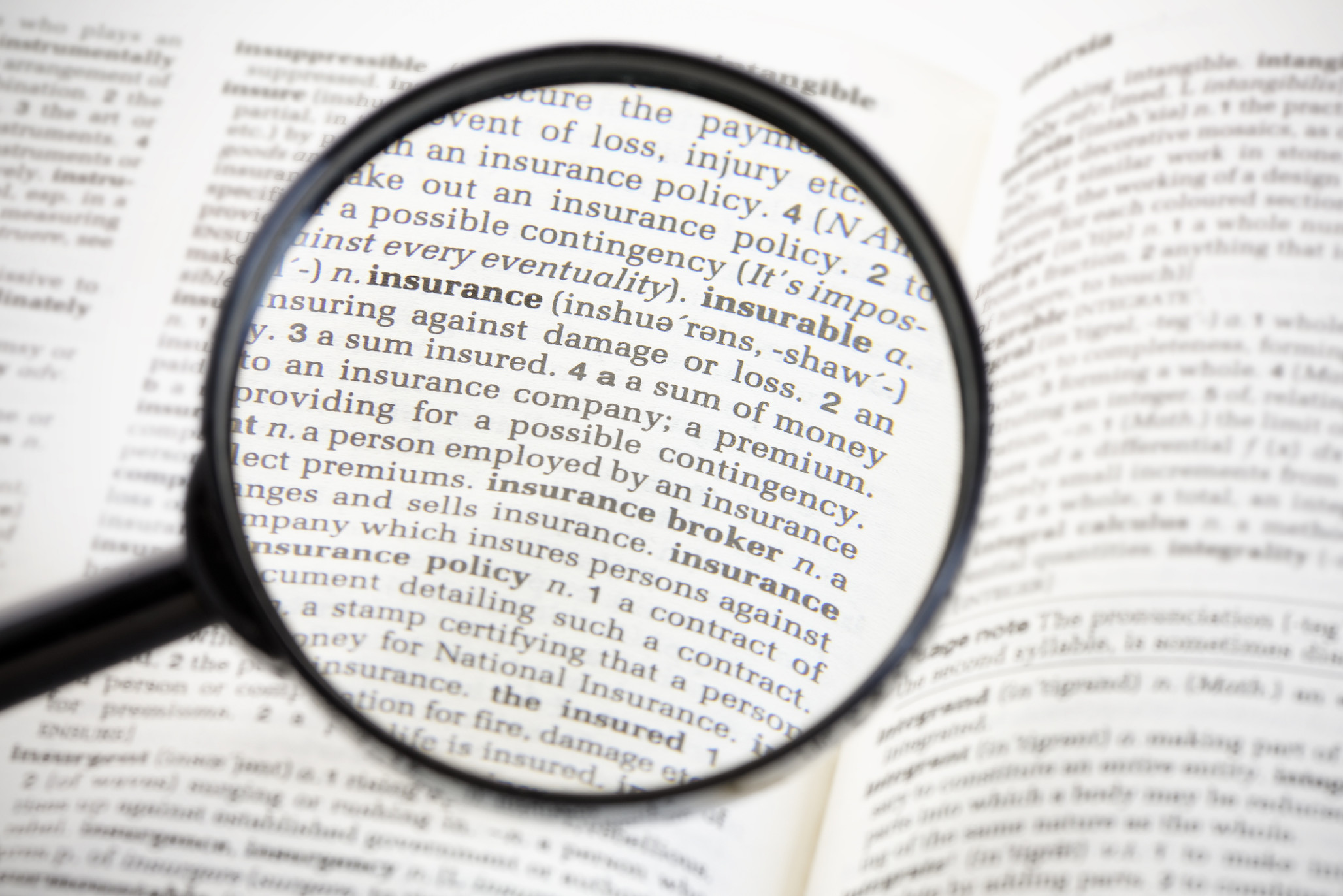
A Guide To Understanding Insurance Terminology
Applying for insurance can often be difficult enough as it is, thanks to the massive variety of them, and the different benefits they each offer. However, equally as difficult as finding the perfect insurance policy is understanding some of the specialized terminology used in the insurance world.
Such terminology is used often to describe specific policies, and without understanding them properly it can be very risky to apply for an insurance policy. As such, you are probably here because you want to know what some of these highly-specific terms refer to. If so, look no further than right here, because we are going to look into some of the most common terminologies that trip many people up when it comes to insurance.
What is “Insurance”?
Insurance generally refers to an agreement that is made between a person or a company and an insurance company that provides compensation to the insurance claimer in the event of certain things such as damage to objects, illnesses, or death. This is a legally binding contract that is entered into by both the insurance company and the individual.
In order for insurance to be rendered in effect, a premium must be paid by the insurance claimer.
What is “Loss”?
Loss refers to general damages, be they accidental or intentional, to a property or vehicle that is covered by an insurance policy. Loss is basically a general term used to refer to all situations in which an insurance claim may be made, especially in regard to damaged property.
What is a “Loss History”?
When you apply for an insurance policy, the insurance company will need to take a look at the number of losses that have occurred to your property in the past, in order to ensure that it is sensible to cover you.
What is a “Claim”?
Put simply, a ‘claim’, in the context of insurance, refers to the act of applying for the compensation that is offered by an insurance policy. Such an application would usually be made directly after a loss had been suffered, such as a house fire, or a car accident.
(To encompass both 1st party claims and 3rd party claims)
What is “Liability”?
Liability insurance is a special form of insurance that is paid out to a third party, rather than being paid out to the person with the insurance policy. This is most commonly used in the event of something like a car crash. If the person covered by the insurance policy is found to be liable for a car crash involving other people, then the liability coverage will ensure that the other people, should they sue, are fully compensated financially.
What is “Negligent”?
To be negligent within the context of insurance refers to failing to exercise a level of care that would be expected of a reasonable person in similar circumstances for the things that are covered by your insurance policy. Let’s say you had insurance for your business in the event someone injures themselves while in your store. If a customer is injured from slipping on a puddle of water that you spilled and chose not to clean up, it would likely be found that you were negligent, and thus your customer is likely to make a claim against your business’ insurance policy; or you would likely be found to be legally liable for the customer’s injuries.
What is “Premium”?
The premium is basically a fancy word for the money that you pay in order to be covered by the insurance policy. In most cases, the premium will be significantly less than the value that can be paid out in the case that a claim is made.
What is “No-Fault”?
Some states require that insurance companies offer ‘No-Fault’ policies. These basically require that the insurance company pays out their policyholders without considering potential fault in the event of a claim for such things as loss of income, medical expenses, or funeral costs. This can be a great benefit to look out for when applying for insurance for your home.
What are “Conditions”?
These refer to the responsibilities that both the policyholder and the insurance company must adhere to at all times in order for the insurance policy to remain in place. If it is found that either the policyholder or the insurance company did not meet those responsibilities in a satisfying manner, then the insurance policy would no longer be valid.
What is an “Appraisal”?
An appraisal refers to an estimate of the value of your property, so that the amount owed to you when you make a claim after, say, a house fire, will be proportional to the value of your home. This helps you to be sure that you will be fully compensated in the event of such a loss, but also that the insurance company will not pay out too much.
What is a “Deductible”?
The deductible refers to an amount of money that needs to be paid by the insurance policyholder before their claims money can reach them. A higher deductible level can lead to a cheaper insurance policy, so it is worth ensuring that deductibles on your insurance policy are well suited for you and your financial situation.
What is a “Good Driver Discount”?
Some insurance companies may offer additional good driver discounts which allow ‘good drivers’ to achieve cheaper insurance policies. In order to be eligible for such a discount, you will need to prove that you have had a driver’s license for more than three years and that you have earned no more than 1 point on your license.
This is a great incentive for good driving.
What is a “Quote”?
A quote refers to an estimate of the cost of the insurance policy that is provided to the person looking for the insurance policy based on all of the documentation that is provided to the insurance company by the applicant looking for an insurance policy.
What is an “Agent”?
The term ‘Agent’ in the case of insurance, refers to a person who is officially licensed to sell and provide insurance policies while representing the insurance company.
What is a “Policy”?
Policy refers to the written contract that contains all of the important information regarding the insurance that is offered to the applicant. Also known as an insurance policy.
What is a “Policy Limit”?
The maximum amount that a specific policy will pay. Can be impacted by the premium of the policy or the insurance history of the policyholder.
What is “Replacement Cost”?
This refers to the amount that it costs to replace a specific item that is covered by an insurance policy. It is important to note that some insurance companies may only pay out the amount relative to the market value of an item, and not exactly the amount that it would usually cost to replace such an item.
What is “Underwriting”?
Underwriting is basically a rating system that allows the insurance company to determine the insurability of the policyholder. This helps the insurance company to mitigate risks, as they can reject anyone they deem as too risky, ergo, someone who is likely to make frequent claims.
This can also be used to help the insurance company to decide on a price for the policy, by ensuring that it is fair and representative of the risk the policyholder could present.
What is the “Marketplace”?
The ‘Marketplace’ with regards to insurance, refers to a place where individuals can shop through various insurance plans. These marketplaces are great because they force insurance companies to offer competitive prices to attract your attention.
On the marketplace, insurance companies generate ‘leads’, which refer to people who have expressed interest in a service, and that can then likely be converted into a full customer. Leads are incredibly important to insurance companies, as they help them to thrive in such a competitive marketplace.
To Conclude
We hope that this has proven useful and that you now feel much better equipped to take on the challenges that the world of insurance can throw at you.

Rick J. Lindsey hails from Salt Lake City, Utah. He began working in the mailroom of his father’s Salt Lake City insurance firm, getting his introduction to the business that became his lifelong career. Rick J. Lindsey quickly rose through the ranks while working in nearly every imaginable insurance industry job. As an entrepreneur, specialty lines underwriter, claims specialist, risk manager, and a licensed surplus lines broker, Rick J. Lindsey is highly skilled in all levels of leadership and execution. As he progressed on his career path, Rick J. Lindsey discovered an urgent need for insurers willing to write policies for high-risk individuals and businesses. He was frequently frustrated that he could not provide the liability protection these entities desperately needed to safeguard their assets. He also formed the belief that insurance companies acted too quickly to settle frivolous claims. Rick J. Lindsey decided to try a different approach. He started an insurance company and became the newly formed entity’s CEO. This opportunity has enabled Rick J. Lindsey to fill a void in the market and provide a valuable service to businesses, individuals, and insurance agents who write high-risk business. XINSURANCE also specializes in helping individuals and businesses who live a lifestyle or participate in activities that make them difficult for traditional carriers to insure. If you’ve been denied, non-renewed, or canceled coverage, don’t give up quite yet. Chances are XINSURANCE can help.

